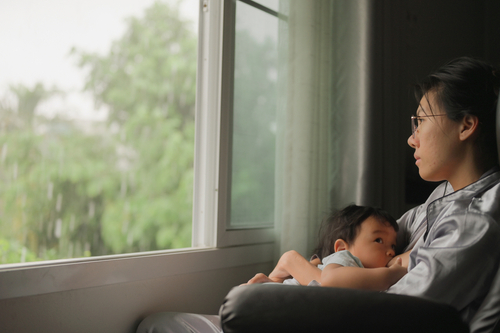Most people have heard of postnatal depression, but many mental health conditions can occur in the perinatal period (pregnancy and postpartum). These are summarised below:
Perinatal Anxiety
During pregnancy, this can involve excessive or hard-to-control worry about pregnancy-related concerns (such as about baby, the pregnancy progressing, birth, and more). After birth, postnatal anxiety often involves worry about baby, such as about their feeding, sleep, settling, routines, breathing overnight, starting solids, or being apart from your baby. There can also be worry about other life areas too.
In addition to the concerns and worries, women often feel tired, have difficulty concentrating or a mind that goes blank, feel tense or restless, irritable or angry, have tense or sore muscles, and have insomnia (difficulty going to sleep or staying asleep).
People may also have panic attacks, which are intense, short-lived, but overwhelming anxiety episodes that are difficult to control. Panic also has many physical symptoms such as a racing heart, difficulty breathing normally, and feeling shaky or faint (and other physical symptoms).
Perinatal Depression
Depression may occur during pregnancy (antenatal depression) or postpartum. People have either a low mood or a loss of interest in things they usually find enjoyable, or both of these symptoms. Women will also experience changes in sleep, appetite + eating (and sometimes weight), and difficulty thinking or concentrating. There may be thoughts about death, feeling agitated (or the opposite: feeling slowed down), having a lack of energy or tiredness nearly every day, feeling worthless, or feeling quite guilty. Essentially, everything feels harder and more effortful, and you may have lost the interest or motivation to push through.
Perinatal Post-Traumatic Stress Disorder (P-PTSD)
P-PTSD can occur as a result of trauma experienced in pregnancy or postpartum; most commonly, I’ve seen it as a result of birth trauma. However, P-PTSD can also occur from other traumas, such as: serious health conditions (e.g., Hyperemesis Gravidarum, or HG); unexpected or invasive medical intervention; baby being admitted to intensive care; or anything else that causes fear and distress. P-PTSD involves reliving the trauma (such as through distressing memories, nightmares, or flashbacks), and experiencing distress or physical responses on reminders of the trauma. There are usually efforts not to think about what has happened and avoid reminders of what you’ve experienced (for example, not wanting to hear or see any birth stories, visit any hospitals, or have another pregnancy).
Postpartum Obsessive Compulsive Disorder (OCD)
After birth, many women experience worrying and intrusive thoughts about bad things happening to baby. However, when this occurs a lot (daily, and repeatedly throughout the day), it can be considered an ‘obsession’; and when you feel compelled to do rituals to prevent these bad outcomes, these are known as ‘compulsions’. The rituals are often hard to shake; women feel they must do them, even if they aren’t logically going to prevent the feared outcome. For example, worrying a lot about leaving baby in a car might result in a ritual of touching the car a certain way every time you get in and out of it, and touching baby repeatedly when in the house, to make sure baby doesn’t get left in the car. People don’t need to have both obsessions and compulsions to have OCD; it can be one or the other.
Postpartum Rage
This involves episodes of intense anger that are difficult to control. There are outbursts, and often women feel guilty, ashamed, and awful afterwards. You might dwell on the bad things that frustrate you, and then reach a peak where you end up exploding. And then because you try so hard not to do it again, things can just build up until the cycle repeats itself. Postpartum rage can be part of postpartum anxiety, depression, P-PTSD, or occur on its own.
Dysphoric- Milk Ejection Reflex (D-MER)
This is when the let-down reflex during breastfeeding triggers a flood of negative thoughts, feelings, or body sensations. Women can suddenly feel anxious and panicky, a sense of dread, tearful or low, irritation or anger, suddenly have negative thoughts about yourself or baby (and anything, really), and thoughts of death. There may be physical sensations such as feeling restless, like your skin is crawling, or your nerves are being grated. These feelings typically fade away after the let-down or when baby stops feeding.
Postpartum Psychosis
Postpartum psychosis is a serious (but not common) condition which can involve hallucinations (experiencing things that aren’t there for other people, such as hearing voices, seeing images, or unusual smells) or delusions. Delusions are fixed, untrue beliefs that are unshakeable, for example, believing that other people are controlling your thoughts. Postpartum psychosis benefits from medical intervention first and foremost.
The difficulty is that when you’re navigating pregnancy or life with baby (sometimes with other children in tow), it can be overwhelming when you’re not feeling like yourself. The good news is that many of these conditions respond to treatment.
Seek help early- you don’t have to come last, just because you’re a mother.
And, if the help you find doesn’t fit you (or isn’t actually helpful), try and try again- because things can get better.

